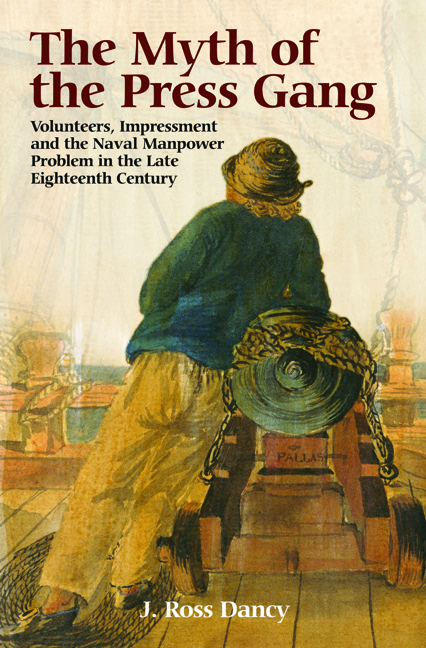 The Myth of the Press Gang
The Myth of the Press Gang 2 - Manning Statistics
Published online by Cambridge University Press: 05 May 2015
Summary
Critical to the success of every European navy in the eighteenth century was the ability to acquire men with seafaring skills. Without skilled men to handle sails, both in good and bad weather, any ship would find itself in peril. The Royal Navy drew its manpower from a world-leading mercantile and fishing fleet, which had increased in size, power and prosperity during the eighteenth century. Manning the fleets during wartime was one of the largest problems faced by the Royal Navy, a problem that grew increasingly throughout the eighteenth century, as the Navy, along with British sea trade, expanded. This resulted in a struggle for the resource of skilled manpower, made most evident during the mobilisation from peace to wartime footing. In the French Revolutionary Wars the problem was greater than ever before, as the Royal Navy expanded from 17,000 men in 1792 to over 130,000 in 1801. By 1810, British naval manpower had reached over 145,000 men, about 2.7 per cent of Britain's male population. Recruiting seamen in the eighteenth century was essentially a problem of supply, pitting the requirements of the Navy and merchant sea trade against the population of mariners available. In the end there were not enough seamen to fully man the Royal Navy and the merchant fleets at the same time.
Analysing eighteenth-century naval manning has always been challenging. The main problem is a lack of statistical data on the subject, without which the actual outcome of naval manning efforts is difficult to determine. Without solid numbers, obtaining an accurate understanding of the men that the Royal Navy recruited is nearly impossible. Examining primary source material, such as letters or Admiralty instructions, allows for a basic understanding of naval manning and how it was received by both officials and the public; however it does little to show anything about the men who actually served in Royal Navy ships.
- Type
- Chapter
- Information
- The Myth of the Press GangVolunteers, Impressment and the Naval Manpower Problem in the Late Eighteenth Century, pp. 28 - 55Publisher: Boydell & BrewerPrint publication year: 2015
